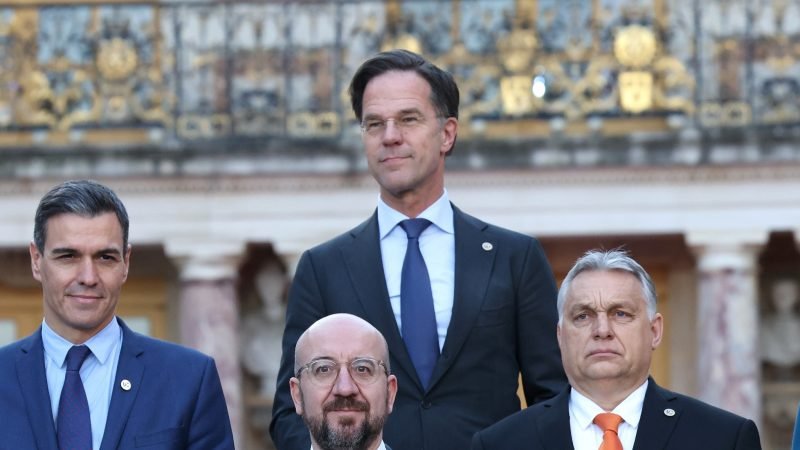European Union leaders have condemned Russia’s “unprovoked” military aggression but pulled back on putting Ukraine on a fast track to bloc membership.
Last week in a passionate address, Ukrainian president Volodymyr Zelensky spoke directly to EU lawmakers and leaders by video link from Kyiv, asking them to speed up his war-ravaged country’s membership of the bloc.
One week later the tone has become less enthusiastic.
After hours of debate, EU leaders on Thursday (10 March) stopped short of concrete commitments on Ukraine’s appeal for rapid accession to the bloc and differed over the reach of sanctions against Moscow.
Russia’s war on Ukraine has seen a surge of support in the EU for Ukrainian President Zelenskyy, but EU leaders were expected to tone down Kyiv’s hopes even before the summit
In Versailles, they made clear a speedy track to membership was impossible.
In their joint statement published in the early hours of Friday morning, EU leaders “acknowledged the European aspirations and the European choice of Ukraine”, saying the country’s membership application had been “swiftly” transmitted to the European Commission for providing an assessment.
Earlier, the European Commission has been tasked to prepare an opinion, the so-called “avis,” as to the country’s readiness to open negotiations.
However, despite the rejection of a fast-track process, EU leaders pledged to bring Ukraine closer to the EU politically.
“Pending this and without delay, we will further strengthen our bonds and deepen our partnership to support Ukraine in pursuing its European path. Ukraine belongs to our European family,” they said in the statement.
There is no such thing as a fast track
Host French President Emmanuel Macron, who over the past years has been very reluctant on the enlargement of the bloc, had spoken about the “need to send a strong signal at this time to Ukraine and the Ukrainians” but “be vigilant”.
“Can we open an accession procedure today with a country at war? I don’t think so. Should we close the door and say never? That would be unfair. Can we forget about the balance of the region? We must be careful,” he had told reporters before the summit.

The Netherlands, however, was among those currently the strongest opposed to granting Kyiv a shortcut to what usually is a lengthy process.
“There is no such thing as a fast track,” Dutch Prime Minister Mark Rutte said as he arrived for the talks in Versailles.
“I want to focus on what can we do for Volodymyr Zelenskyy tonight, tomorrow, and EU accession of Ukraine is something for the long term, if at all,” he added.
According to EU diplomats, Rutte had accepted a reference in the statement to “the relevant treaties,” pushed for by Poland, the Baltic States and Slovakia as the EU’s treaties set out the procedure for becoming a member.
This was the next best thing, as EU officials earlier stressed that any statement or declaration mentioning Article 49 (referring to EU enlargement) in relation to Ukraine would have been “a bridge too far”.
“Nobody entered the EU overnight,” Croatia Prime Minister Andrej Plenkovic said, whose country has been the latest to join the bloc in 2013.
Beyond the membership debate, European Council President Charles Michel highlighted a proposal to provide an additional €500 million in assistance through the EU’s European Peace Facility (EPF), which is being used to provide military aid to Ukraine.
EU leaders also pledged more support to Kyiv, including the promise to help rebuild Ukraine after the war.
“We are committed to provide support for the reconstruction of a democratic Ukraine once the Russian onslaught has ceased,” EU leaders stated.
“We are determined to increase even further our pressure on Russia and Belarus. We have adopted significant sanctions and remain ready to move quickly with further sanctions,” they added.
In their statement, EU leaders noted that they had asked the European Commission to issue an opinion on membership applications from Moldova and Georgia, the other two recent applicants next to Ukraine.
Support Independent Journalism Today
Our unwavering dedication is to provide you with unbiased news, diverse perspectives, and insightful opinions. We're on a mission to ensure that those in positions of power are held accountable for their actions, but we can't do it alone. Labour Heartlands is primarily funded by me, Paul Knaggs, and by the generous contributions of readers like you. Your donations keep us going and help us uphold the principles of independent journalism. Join us in our quest for truth, transparency, and accountability – donate today and be a part of our mission!
Like everyone else, we're facing challenges, and we need your help to stay online and continue providing crucial journalism. Every contribution, no matter how small, goes a long way in helping us thrive. By becoming one of our donors, you become a vital part of our mission to uncover the truth and uphold the values of democracy.
While we maintain our independence from political affiliations, we stand united against corruption, injustice, and the erosion of free speech, truth, and democracy. We believe in the power of accurate information in a democracy, and we consider facts non-negotiable.
Your support, no matter the amount, can make a significant impact. Together, we can make a difference and continue our journey toward a more informed and just society.
Thank you for supporting Labour Heartlands












